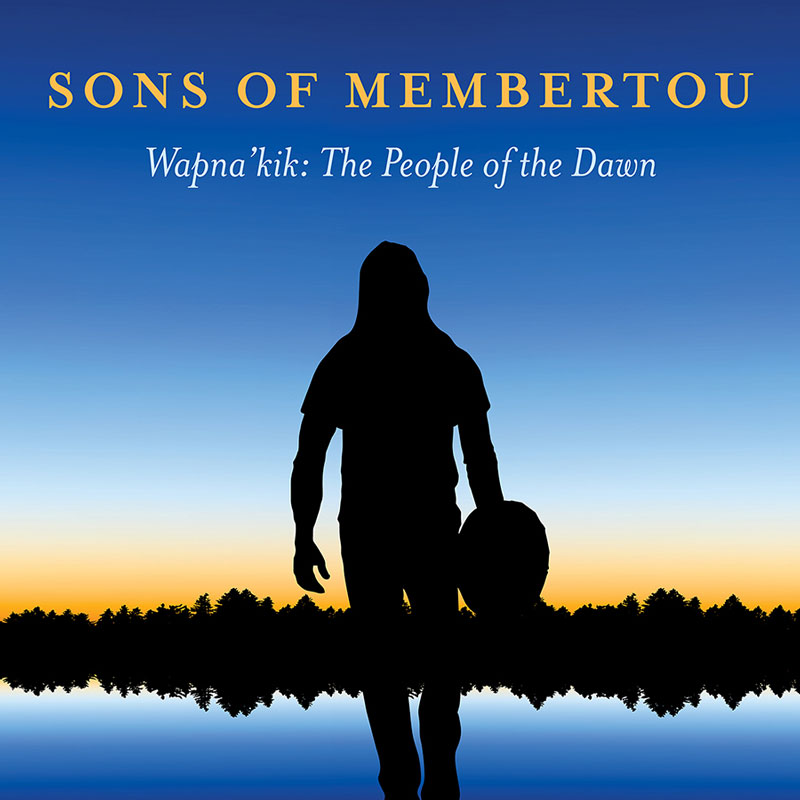Sons of Membertou – Wapna’kik: The People of the Dawn (Smithsonian Folkways Recordings 2025)
Folk music, at its most profound, serves as a bridge—between past and present, ancestors and descendants, land and people. Wapna’kik: The People of the Dawn, the seminal 1995 release by the Mi’kmaw group Sons of Membertou, is such a case. As it returns, newly remastered and expanded, for its first digital release under Smithsonian Folkways’ Sound Communities series, Wapna’kik serves as both a reclamation and a renewal, an album where resilience, history, and tradition intertwine.
To hear Wapna’kik is to feel the pulse of Mi’kma’kik, the ancestral lands of the Mi’kmaq, stretching from Unama’kik (Cape Breton) and across the eastern shores of Turtle Island (indigenous name for North and Central America). The heartbeat of the album is its drumming, steady, communal, insistent, calling forth memories long silenced by British and French colonial repression. This drumming, central to Mi’kmaw musical identity, evokes both the deeply grounded powwow tradition and the specific cultural echoes of the Membertou community. The songs are built on call-and-response vocals, a form that binds the singers in a shared breath and a collective purpose, reinforcing the themes of unity and endurance.
When Sons of Membertou first formed in 1992, it was at the urging of Elders who recognized the urgent need to restore sacred songs that had been nearly erased. Darrell and Sharon Bernard took up that charge, learning under the guidance of Mi’kmaw singer and songwriter George Paul. This reissue includes Bernard’s reflections in new liner notes, tracing the group’s journey from hesitant revivalists to proud cultural stewards. Each track feels like an invocation, a tribute to those who carried these traditions through centuries of struggle.
One of the most powerful additions to the reissue is the “Mi’kmaq Honor Song,” often regarded as the nation’s anthem. Unlike the album’s other powwow-style tracks, this song unfolds differently: each singer moves through the melody individually, their voices weaving a rich and layered style. The effect is striking: many voices echo the same history, but each with their own inflection, their own experience of survival and strength.
The album’s fusion of old and new traditions is another reason for its lasting impact. Though rooted in Indigenous drumming, Wapna’kik also embraces contemporary influences, bridging traditional Mi’kmaw sounds with modern instrumentation. This duality is not a concession to time, but a reflection of how living traditions evolve, absorbing and adapting while remaining true to their origins. It’s heard in tracks like “500 Years,” one of the newly included songs, which transforms centuries of grief into a deeply felt anthem of endurance and reclamation.

For listeners new to Mi’kmaw music, Wapna’kik offers a gateway, an invitation, as Sons of Membertou drummer and singer Graham Marshall puts it: “Come into our communities. Come visit us. Let’s break bread together. Let’s get to know one another.”
“I can feel that our ancestors are smiling and looking down on us today at what we have accomplished,” Marshall reflects on the album. “That we were able to digitize the recordings means that the next generations ahead can always go back and learn from that. As Mi’kmaw people, we are always thinking ahead seven generations. We tell our audience and our people, ‘What legacy would you leave behind?’ When we do a project like this, when we go into the next world, we can feel that our hearts are complete and our mind is complete, that we’ve done our job, of passing it down to the next generations.”
Wapna’kik: The People of the Dawn is the first release in the Sound Communities recording series, a collaboration between the Centre for Sound Communities at Cape Breton University and Smithsonian Folkways that present artists who share narratives of the landscapes, waterways, and communities of Turtle Island, with a particular emphasis on the regions recognized as Canada.
Sons of Membertou Bio

The Mi’kmaw people have lived in Mi’kma’ki (Cape Breton, Nova Scotia) for centuries, sustaining themselves through the land and ocean. The Sons of Membertou is a traditional music group dedicated to preserving and sharing Mi’kmaw culture through song, dance, and prayer.
In 1992, Elders entrusted a drum to Darrell and Sharon Bernard, asking them to bring it back to their community. Under the Elders’ guidance, they recorded both traditional and original songs, leading to the release of their debut album, Wapna’kik: The People of the Dawn. The album blends traditional drumming with contemporary Cape Breton instrumentation.
Re-released by Smithsonian Folkways Recordings, the album remains central to the group’s performances across Canada, Turtle Island, and beyond. Sons of Membertou continue to promote Mi’kmaw culture and language by engaging young people and welcoming new members. Msit No’kmaq!
Sons of Membertou members on this recording: Rodney Bear, Darrell Bernard, Sharon Bernard, Austin Christmas, Ben Christmas, Frances “Puddy” Christmas, George Christmas, Victor Christmas, Clifford Copage, Lincoln Gould, Craig Hodder, Mark A. Isaac, Dawn Isadore, J.R. Isadore, Lonnie Jones, Angelo Laporte, Brian Marshall, Graham Marshall, Calvin “Jip” Paul, Shane Paul, and George Smith.
Additional musicians on this recording: Allie Bennett (bass), David Burke (keyboard), Richard Burke (flute), Shawn MacDonald (fiddle), Kyle MacNeil (fiddle), Dave McKeough (guitar), Kim Lanze (viola), Angel Paul (vocals).
Buy Wapna’kik: The People of the Dawn.
Track listing:
- The People of the Dawn/Wejkwita’jik (The Gathering Song) 4:40
- Sma’knis (Veteran’s Song) 4:08
- Kepmite’tmnej (Mi’kmaq Honour song) 8:30
- The Mountain/Mukla’qati 4:09
- 500 Years 4:22
- Kwan’to’te’ 3:00
- Kwa’nu’te’ 4:01
- Ko’jua (Partridge Dance) 2:58
- The People of the Dawn/Kniskamijinaq (The Ancestors’ Song) 8:15


